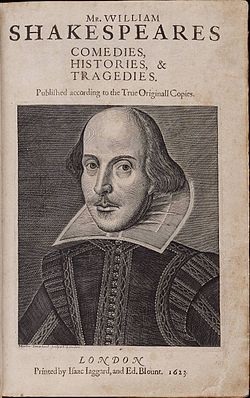Few people have difficulty in recognising William Shakespeare as the true author
of those works that bear his name. Unfortunately, there are some who cannot resist Bard Bashing
by posing what they are pleased to term the Authorship Question.
Though relatively few in number, as with all pressure groups, their clamouring often gives the impression
that there are more of them that there actually is. When we consider there are over fifty alternative
candidates for the authorship of Shakespeare’s works, then conspiracy theorists are divided
into over fifty separate camps.
Our common sense tells us that it is impossible for all of them to be the "real" Shakespeare,
so logic dictates that the rest are barking up the wrong tree
(or barking mad as some of them undoubtedly are). It may be true that the main contenders are
something around the nine or ten mark, yet even so, the same principle still applies.
The sheer number of alternative candidates is testimony to the gullibility
of their adherents, each of them certain they can "prove" their man (or woman in some cases)
is the true Bard. All these arguments are wrapped up in dubious semantics and intellectual pretension
so that the process of clear logic is subjugated.
Every candidate for the "real" Shakespeare can be shown to have lived a life
where their personal circumstances are embedded or reflected in the plays and sonnets.
It matters little if
the favoured candidate was alive or dead at the time, a mighty lord, a countess or
even a cobbler's son from Canterbury!
The very fact that all authorship candidates can be made to fit a single profile
tells us this is not a process of rational thought.
The idea that the plays and sonnets are autobiographical is essential to the conspiracy theorist.
They need to make this claim to enable them to draw comparisons with their favoured alternative.
Certainly Shakespeare's work would be influenced by his own experiences and what he
had observed in his contemporaries, but as a dramatist he would want to portray society
in a way that his audiences and sponsors would recognise; this is not autobiography but it
does explain why it is so easy to claim that it is.
Most historical truths, when stripped of their hyperbole, turn out to stem from simple and ordinary
origins.
The Bard came from a humble, middle-class background. Armed with a grammar school education,
he entered the Tudor literary fraternity
without the benefit of a powerful sponsor. He had to attract sponsorship through his written work.
In those unhealthy and politically turbulent times a sponsor could be lost in a moment,
so he also had to cultivate others for just such an eventuality.
Thus we find "profiles" that fit practically anyone in contemporary Elizabethan society.
He placed references in his work that his sponsors, potential or actual,
would believe to be themselves. Even today, his work is often quoted to support
circumstances in our own lives, so it is not
surprising that any alternative candidate can be made to fit. Shakespeare deliberately
arranged his work that way.
A favourite ploy of the bard bashing critic is the production of lists of eminent persons, both from
the pages of history and the arts, as well as academia, who for reasons of their own are prepared to
testify to the impossibility
of a plain Englishman from the shires being able to pen works that
have stood the test of time. What is never presented is a tandem list of those with
similar intellectual profiles who are quite happy with Shakespeare as the author of his own works.
Such a list would considerably overwhelm that of the doubters. The arguments of anti-strarfordians
depends on this sort of censorship, leaving out any conflicting evidence or opinion.
In all other human spheres of operation, we have no difficulty in
attributing such tactics to the spurious argument,
but intellectual snobbery is a powerful force which easily overcomes reason.
Casual readers, looking for mischievous amusement, are attracted to the alternative authorship question.
These may never have attended a Shakespeare play, or have even a passing acquaintance with
his poetry. Even fewer understand much of Elizabethan drama or the workings of the players' fraternity
of the period. Those who do understand these things have no truck with the
authorship question and therefore refuse to engage in it.
With no axe to grind, this reluctance to enter the argument by those with a more reputable opinion leaves the arena
free to the conspiracy theorists, giving them an appearance of substance when, in reality,
there is nothing there at all. If this were not so, then there would logically only be one proven
William Shakespeare - actually there is - it is . . . William Shakespeare.
Here is a link to the Shakespeare Birthplace Trust.
|

Title page of the First Folio
|
| Home Page |
|
